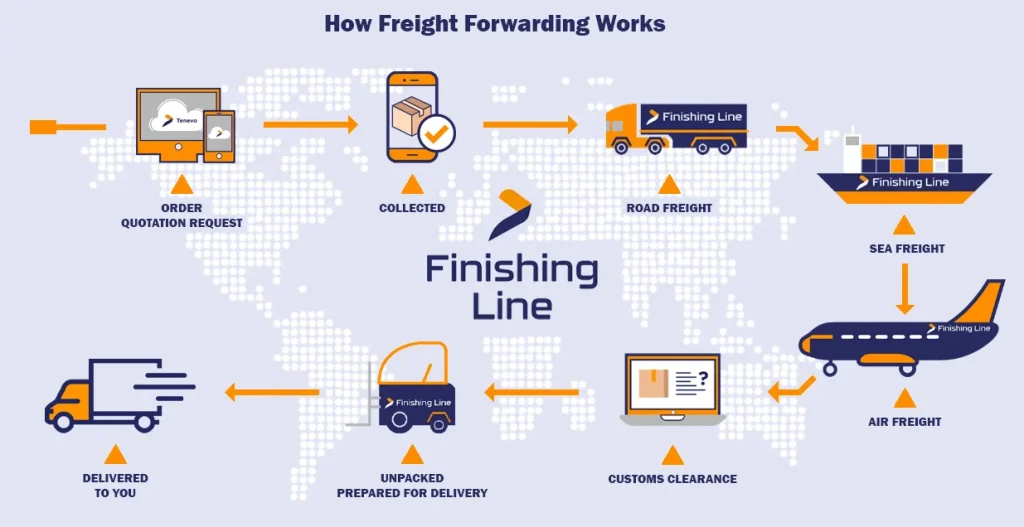Inventory Management Mistakes That Cause Shipping Delays
Home Inventory Management Mistakes That Cause Shipping Delays Shipping delays are one of the biggest frustrations for…
If you’ve ever wondered why shipping quotes vary so much from one logistics company to another, you’re not alone. Freight forwarding isn’t just about moving goods from point A to point B, it’s about coordinating a complex chain of services that ensure your cargo reaches its destination safely, on time, and in compliance with international regulations.
Whether you’re working with a freight forwarder in Pakistan or an international logistics company, understanding what you’re really paying for helps you make smarter and more cost-efficient shipping decisions. Let’s break down how these costs are calculated and what factors influence your final freight bill.
A freight forwarder is a logistics professional who organizes the transportation of goods on behalf of businesses and individuals. They don’t usually move the cargo themselves — instead, they act as intermediaries between shippers and various transportation services like shipping lines, airlines, and trucking companies.
Think of a freight forwarder as your personal logistics manager — they handle everything from booking space on a vessel or flight, to preparing documentation, to coordinating customs clearance.
If you’re exporting or importing goods through Pakistan’s major ports like Karachi or airports in Lahore, you’ll likely need a freight forwarder in Pakistan who understands local regulations, documentation requirements, and customs procedures. Having a reliable partner on the ground can make the difference between a smooth shipment and costly delays.
When you receive a freight forwarding quote, you’re not just paying for transportation. There are multiple cost elements that add up to the total bill. Here’s what they typically include:
The main portion of your expense comes from actually moving goods, either through sea freight services or air freight services. Sea freight is generally cheaper but slower, ideal for bulk shipments. Air freight, on the other hand, offers faster delivery but comes at a premium cost.
These transportation rates are influenced by global market conditions, fuel prices, container availability, and seasonal demand.
Every time your cargo is loaded, unloaded, or moved between transport modes, handling charges apply. This includes port handling, terminal charges, and warehousing fees.
A clearing agent in Karachi or any other port city facilitates the legal entry or exit of goods. They ensure all documentation and duties are properly handled. Customs clearance fees include government charges, processing costs, and agent service fees.
Freight forwarding requires a lot of paperwork — bills of lading, commercial invoices, certificates of origin, and more. These documents ensure your shipment meets legal and international trade requirements. The preparation and verification of these documents add to your cost.
Freight forwarding involves risk, loss, theft, or damage can occur during transit. Many businesses choose to insure their shipments. While insurance is optional, it’s a wise investment for high-value cargo.

One of the biggest cost decisions in freight forwarding is choosing between sea freight and air freight. Both have distinct advantages depending on your needs:
For many businesses in Pakistan, the choice depends on balancing cost, urgency, and reliability. A trusted logistics company in Lahore or any other city can help you choose the most cost-effective and timely option.
Even after receiving a quote, there are a few potential hidden costs that can surprise new shippers. Understanding these can help you budget better and avoid unpleasant surprises later.
These additional costs are standard in the logistics industry, but transparency from your freight forwarder can make a huge difference. Always ask for a detailed cost breakdown before booking.
While some charges are unavoidable, there are several ways you can lower your overall logistics expenses:
Advance booking allows freight forwarders to negotiate better rates and secure space availability, especially during peak seasons.
If possible, combine smaller shipments into a single load. This reduces per-unit costs for both air and sea freight services.
Efficient packaging reduces volumetric weight, a major cost factor for air freight.
A reputable freight forwarder in Pakistan will offer transparent pricing, clear communication, and guidance on saving costs without compromising service quality.
Incomplete or incorrect paperwork can lead to customs delays, fines, or storage charges. Working with an experienced clearing agent in Karachi helps prevent such issues.
Building a consistent relationship with a logistics company can unlock loyalty discounts and priority services.
Freight forwarding is more than just transportation, it’s about trust, reliability, and expertise. The right logistics partner helps you manage complex international trade processes seamlessly.
Here’s what to look for when selecting a logistics company in Pakistan:
For businesses in major trade hubs like Karachi and Lahore, choosing a dependable logistics company can make or break your supply chain efficiency.
Understanding your freight forwarding costs gives you control. It allows better planning, budgeting, and negotiation. More importantly, it ensures that you’re comparing quotes fairly not just by price, but by service quality.
Transparent logistics providers explain every line item on your quote, helping you see exactly what you’re paying for. They act as your strategic partners, not just service vendors.
Freight forwarding costs may seem complicated at first, but once you understand what goes into them, it becomes easier to make informed, strategic decisions. From transportation and handling to customs clearance and insurance, every cost plays a vital role in ensuring your cargo reaches its destination efficiently.
When choosing your logistics partner, focus on reliability, transparency, and customer service — not just the lowest quote. A trustworthy company helps you save in the long run by avoiding hidden charges and shipment delays.
If you’re looking for a professional freight forwarder in Pakistan offering end-to-end sea freight services, air freight services, and customs clearance, Bismillah Logistics is your trusted choice.
Home Inventory Management Mistakes That Cause Shipping Delays Shipping delays are one of the biggest frustrations for…
Home Why Efficient Supply Chains Are Crucial for Growing Businesses In today’s competitive market, businesses of all…
Home Documentation Errors That Can Delay Your Imports and Exports In international trade, time is money. Delays…